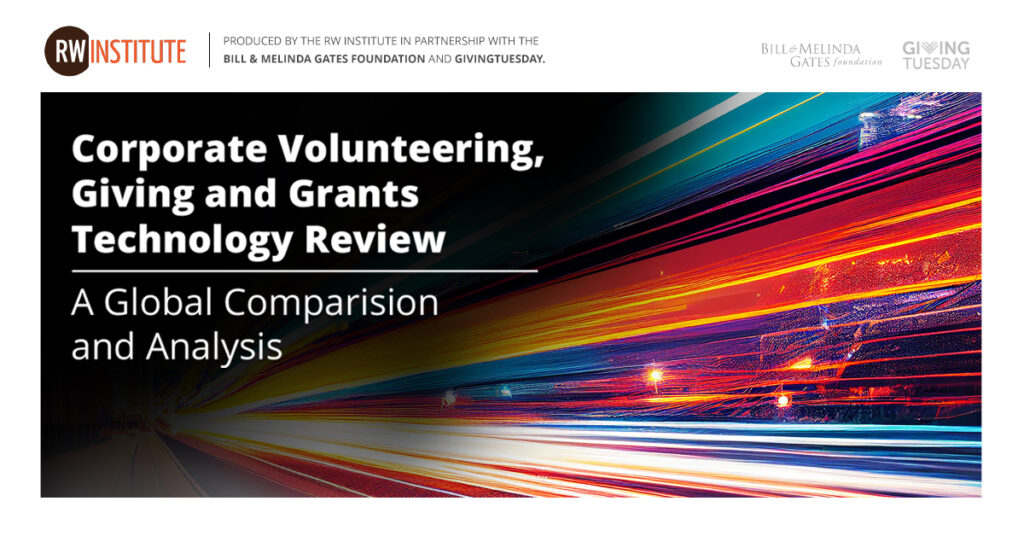The past two decades have seen tremendous growth in corporate citizenship programs, specifically those focused on social impact through philanthropy, volunteering, grants, and partnerships. Simultaneously, technology innovation has helped enable more strategic approaches by automating processes, centralizing data, and providing analytics for continuous improvement. This convergence presents a pivotal opportunity to drive social change at scale through effective adoption of platforms purpose-built for CSR.
Our 2023 Corporate Volunteering, Giving and Grants Technology Review provides comprehensive insights to help organizations make optimal decisions when procuring solutions. For this third edition, we expanded our research to cover 41 of the total number of 74 known solution providers, incorporating the perspectives of 107 practitioners across 105 companies, as well as future-oriented insights from 10 of the solution provider executives. The extensive surveys, demos and interviews enabled holistic analysis of the landscape to showcase relevant innovations in functionality, measurement, and storytelling capabilities.
2023 CORPORATE VOLUNTEERING, GIVING, AND GRANTS TECHNOLOGY REVIEW
The Corporate Volunteering, Giving and Grants Technology Review, is produced by the RW Institute in partnership with the Bill & Melinda Gates Foundation and GivingTuesday. The review is the only one of its kind in the industry, offering CSR practitioners with a comprehensive overview of platforms from around the world that support employee giving, volunteering, and grant programs, as well as unique insight into technology procurement, implementation, and adoption.
Vendor Survey Reveals Breadth of Solutions
A centerpiece of our research was a broad vendor survey completed by 41 technology providers worldwide. This enabled a detailed examination of each platform’s capabilities, integrations, pricing models and target markets.
We spotlight solutions focused on corporate volunteering, giving, grants management and multi-program tools from regions including the United States, Canada, Europe, Australia, Singapore and the United Arab Emirates. This geographic diversity provides a comprehensive view of the global CSR technology ecosystem.
Several trends emerged from our analysis of the vendor data:
- Targeted platforms have emerged for nearly every program area including volunteer engagement, donation processing, nonprofit grantmaking and integrated CSR management suites.
- Providers range from Vista Equity-backed Benevity valued at over $1 billion to niche startups like Deedmob. Mature solutions have extensive implementation experience while newer entrants promise cutting-edge capabilities using blockchain, AI and predictive analytics.
- The digital transformation of social impact programs is borderless, though regional gaps remain. Coverage is strongest in North America and Europe. Platforms are actively expanding into Asia Pacific, but availability in parts of South America, Africa and Southeast Asia remains limited.
- English dominates as the default language, but vendors like Benevity and Galaxy Digital increasingly offer multilingual interfaces to aid adoption across global workforces. However, solutions localized for specific countries are still rare.
This vendor landscape reveals how technology enables more coordinated, data-driven approaches to CSR, but providers must continue enhancing global functionality. The ideal scenario would be harmonized platforms allowing localized customization, not disjointed regional solutions. As corporate citizenship rises in importance worldwide, technology must prioritize the facilitation of integration.
Practitioner Insights Guide Adoption
Equally enlightening are the insights we gathered from 107 CSR managers worldwide through in-depth surveys. Their candid perspectives provide invaluable guidance for navigating the technology selection and implementation process. Here are some key takeaways:
- Organizations require an average of 4-6 months for procurement, contracting, configuration and launch of a new platform. However, practitioners strongly emphasize the human factors beyond technical integration requiring substantial focus.
- Nearly 40% of respondents cited internal stakeholder alignment as the most challenging aspect of technology adoption. Resistance or lack of buy-in from executives, legal counsel, IT teams or regional offices emerges as common. Practitioners consistently advised involving all key groups from the outset, and proactively addressing concerns through education on program goals.
- Effective change management also emerges as vital for driving employee adoption and minimizing misconceptions about how programs will operate under a new system. Ongoing training and clear communications are essential. Respondents suggest role-based training focused on specific personas like participants, ambassadors, managers and administrators.
- Leadership perspective proves crucial as well. Our executive interviews reinforced devotion of sufficient time upfront for planning and collaboration to ensure the platform can scale strategically. Trying to retrofit technology onto disjointed initiatives creates headaches. Defining desired outcomes and success metrics first provides direction.
For practitioners navigating implementation, the guidance of those ahead on the journey offers a compass. Heed their advice to take a marathon mindset, not a sprint. Embrace technology as an enabler, but put people first.
The Convergence of CSR, DEI and ESG
A key trend revealed in our research is the increased convergence of corporate citizenship with human capital initiatives and ESG priorities.
On the human capital front, we found growing synergies between CSR programs and diversity, equity and inclusion efforts. Thoughtfully designed volunteer projects can directly support belonging and inclusion for employees. Facilitating connections with communities through services fosters perspective-taking that challenge biases and assumptions. These experiential insights spark neuroplasticity, sustaining shifts in mindsets.
On the ESG front, corporate citizenship provides a gateway for community engagement highlighting the “S” in ESG reporting. Volunteering showcases human impacts, while nonprofit partnerships display collaboration for sustainable development. Providers are actively enhancing linking and visualization capabilities to showcase ESG contributions.
This convergence presents opportunities to address complex societal and human capital challenges holistically rather than through disjointed efforts. But realizing this potential requires breaking down historical siloes through education and collaboration across functions. HR, ESG, CSR and DEI leaders must proactively explore shared priorities and coordinate technology adoption to optimize budget and effectiveness.
The past decade witnessed tremendous growth in both corporate citizenship and ESG commitments. Now the opportunity exists to synthesize these efforts for exponentially greater impact by harnessing human potential.
Key Capabilities to Prioritize in Your Selection Process
In synthesizing the extensive findings from both vendors and practitioners, eight factors clearly emerge as the most influential considerations when evaluating potential CSR technology platforms:
- Flexibility to Configure for Unique Program Models: With corporate citizenship initiatives diverse in scope and structure, ensure the platform allows tailored configuration to support your specific program design rather than forcing a rigid one-size-fits-all model.
- Intuitive User Experience: For employee users, the interface and transactions should feel simple and seamless. Complex, confusing systems hinder adoption.
- Holistic Impact Tracking: Look beyond outputs to platforms providing integrated analytics on activities, outputs, outcomes and long-term impacts to convey the full spectrum of performance.
- Seamless Integrations: Seek systems enabling straightforward connections with your HRIS, Finance, Payroll, and other platforms to embed citizenship data across the organization.
- Customization and Branding: White labeling, style overrides, and UI configuration allow platforms to feel like an integrated extension of your brand rather than an disjointed third-party tool.
- Ongoing Training and Support: Change management requires continuous training reinforced through multiple channels. Vendors should provide onboarding guidance then transition to regular refresh opportunities.
- Global Customer Service: For multinational companies, seek providers staffed to support implementations in all your operating regions and key languages without reliance on partners.
- Commitment to Continuous Enhancement: Regular platform upgrades and new feature introduction reflect an innovation mindset aligned to evolving program needs.
The optimal technology fit depends on the maturity and strategic goals of your current citizenship initiatives balanced against internal capabilities and culture. While cost merits consideration, I advise focusing intently on required and desired functionality first, then aligning budget to support the priorities. Technically robust systems that are poorly adopted fail to maximize ROI.
Elevating Measurement to Demonstrate True Impact
A key theme emerging from our benchmarking is the need to enhance measurement capabilities to better convey social impact. Currently, most platforms emphasize tracking program activities, volunteers engaged, and donation amounts. These outputs lack context on the human experiences and real-world changes resulting from corporate citizenship efforts.
This insufficient approach to measurement and reporting risks reducing multi-faceted social impact programs to a series of transactions measured by spreadsheets. But transformed communities are not built through transactions. Lives change through meaningful human connections and sustained, collaborative action.
Truly conveying program performance requires capturing experiential metrics that reflect shifts in attitudes, behaviors, and beliefs – for both volunteers and recipients. What insights did employees gain about systemic inequities or unconscious bias through service? How did a granting initiative build organizational capacity and spur lasting policy changes? What can recipient feedback reveal about the human impacts of partnership?
Many CSR leaders already gather this qualitative data through storytelling, interviews and surveys, but better integrating these human-centric metrics into platform analytics remains a gap. Enhanced data visualization and reporting tools could help convey the fuller narrative of social change. Either way, I advise the industry to elevate measurement beyond a limited set of convenient KPIs that overlook intrinsic human dimensions. Progress requires a dashboard balancing hard numbers with stories capturing hearts and minds changed through conscious corporate citizenship.
Collective Intelligence Enables Innovation
An unexpected finding from our research was lower participation in informal user groups and communities of practice than we anticipated. In our practitioner survey, over two-thirds of respondents reported minimal or no engagement with peer networking groups and forums beyond those facilitated directly by their technology vendor.
This reveals a missed opportunity for collective learning. While vendor-led client communities provide a baseline level of idea exchange and troubleshooting, third-party groups enable more open, unbiased discussion of challenges, innovations and best practices. Practitioners can share lessons learned, benchmark adoption metrics, and collaborate on enhancing programs – not just debating features.
The reasons cited for low participation reveal some common misconceptions. Many managers assumed no independent groups focusing on CSR technology existed or they lacked time to participate. Some expressed uncertainty on how to locate and join communities beyond the vendor’s own client forum. Several noted they gained enough insights from the vendor’s resources.
However, our interviews with experts and review of industry activities uncovered a range of practitioner-led groups facilitating valuable peer exchange. For example, the Corporate Citizenship Network based in the UK hosts events, shares reports, and connects managers across companies. In the United States, Fund the People has built an engaged community focused on grants management innovations. LinkedIn also contains various active groups focused on topics like technology for good, CSR trends, ESG investing and sustainable business.
While vendor client groups play an important role, third-party communities enable more open, critical evaluation of platform capabilities beyond a single provider’s solutions. Practitioners can discuss common pain points, learn creative workarounds, and advocate for desired functionality. Peer insights help managers anticipate and navigate the constant enhancement of systems. Shared experiences build the capacity to scale programs strategically.
Diverse perspectives make us smarter together. Therefore, I advise CSR leaders to actively seek out and engage with independent user communities both locally and online. The collective intelligence will accelerate innovation beyond what any one organization can achieve alone. Start small by joining one new group, then expand involvement over time. The ultimate beneficiaries will be the social causes advanced through continuous improvement.
The Road Ahead
As corporate citizenship increases in strategic importance, those leading social impact programs have an obligation to adopt systems enabling elevated results. Our 2023 review provides an objective compass for navigating the range of available technology solutions. While rapid innovation brings new entrants, I believe the greatest disruption will come from established vendors making impact measurement more intuitive. They possess the scale and capital needed to democratize best practices through software. Startups deliver cutting-edge capabilities that push incumbents to sharpen offerings. Together, expanded access to platforms purpose-built for Social Impact and CSR provides the infrastructure for solving society’s greatest challenges. The road ahead promises exciting progress for those bold enough to lead the way. I invite you to join the journey.







